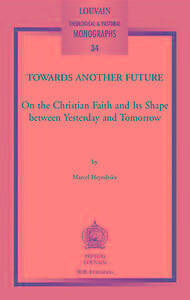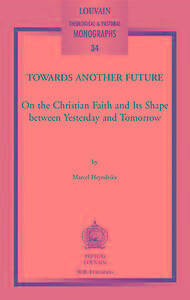
- Afhalen na 1 uur in een winkel met voorraad
- Gratis thuislevering in België vanaf € 30
- Ruim aanbod met 7 miljoen producten
- Afhalen na 1 uur in een winkel met voorraad
- Gratis thuislevering in België vanaf € 30
- Ruim aanbod met 7 miljoen producten
Zoeken
Towards Another Future
On the Christian Faith and Its Shape Between Yesterday and Tomorrow
M Heyndrikx
€ 54,45
+ 108 punten
Omschrijving
From the beginning, the gospel has been understood and articulated in terms borrowed from the cultural context in which it finds itself. For the largest part of the church's history, the prevailing context has worked with a static vision of humanity and the world. Theology and philosophy perpetuated this static worldview. This was both legitimate and necessary as long as the culture was shaped by such a worldview. Since the advent of modernity, however, this is no longer the case. The advent of science and technology has seen the static view of things give way to an understanding of ourselves and our world as dynamic entities. This has made the traditional understanding of faith increasingly untenable. One might say that the gospel has become the prisoner of its previous embodiments. The church's determination to hold on to established forms, and with them the traditional understanding of humanity and the world, has led to its increasing alienation from the prevailing culture, especially in the West. For many in our society, the church's language has become increasingly incomprehensible and its message increasingly untenable. In this book, the author argues that the church's attachment to a static worldview is the fundamental cause of the current crisis, especially as this is manifest in western Europe. He provides a detailed discussion of the European context and analyzes the main features of the traditional, static understanding of faith and its roots in classical culture. He then examines the contemporary crisis of faith and offers a critical evaluation of attempts at 'restoration'. Finally, he proposes a vision of the way forward for the church as it struggles to come to terms with the modern worldview.
Specificaties
Betrokkenen
- Auteur(s):
- Uitgeverij:
Inhoud
- Aantal bladzijden:
- 358
- Taal:
- Engels
- Reeks:
Eigenschappen
- Productcode (EAN):
- 9789042917743
- Verschijningsdatum:
- 18/10/2006
- Uitvoering:
- Paperback
- Formaat:
- Trade paperback (VS)
- Afmetingen:
- 137 mm x 218 mm
- Gewicht:
- 476 g

Alleen bij Standaard Boekhandel
+ 108 punten op je klantenkaart van Standaard Boekhandel
Beoordelingen
We publiceren alleen reviews die voldoen aan de voorwaarden voor reviews. Bekijk onze voorwaarden voor reviews.







